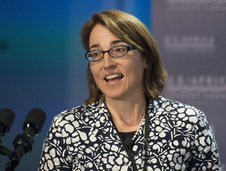
NEW DELHI- Challenging calls for hatred and violence was vitally important for countries like India and the US if they need to take on terrorism, a US official said on Jan 13. Sarah B. Sewall, US Under Secretary for Civilian Security, Democracy and Human Rights, said that justifying bigotry and discriminating against any religious group would not help the cause of fighting terrorism. “Governments can help by ending...

stifling regulations on civil society and allowing citizen groups to peacefully speak and organise around sensitive topics,” she said at the Vivekananda International Foundation here.“They can go a step further by proactively reaching out to build ties with communities targeted by violent extremists for recruitment,” she said, underlining that terrorism was a common foe of India and the US.
Ensuring freedom calls for more than just enforcing laws, the official said. It involves proactively speaking out — as both public officials and private citizens — to challenge calls for hatred and violence.
“Silence can embolden the criminal and the cruel — as in the lynching of a Muslim man last September, or the burning of churches in Odisha.”
“Learning from the past, we must avoid the trap of invoking security to justify bigotry, profiling, and discrimination against any religious or ethnic group — including our Muslim brothers and sisters,” Sewall said.
“That defies not only our deepest values, but strengthens the lies that groups like ISIL tell — lies that democracies are somehow incompatible with Islam.” The official said it was important to address the forces that radicalize individuals to join violent extremist movements. “Desire for belonging, perceptions of injustice and abuse, corruption and neglect, discrimination and marginalization — all can create fertile soil for violent ideologies to take root.” “When extremists murdered Malleshappa Kalburgi in August to silence his critical views — the third such murder in as many years, the Indian literary and artistic community was among the first to condemn the act.” As the US and India face violent extremists, “we must stay true to ourselves — by upholding religious freedom, ensuring legal protection for all, and speaking out against discrimination and hatred of all stripes”, she said.(IANS)
Ensuring freedom calls for more than just enforcing laws, the official said. It involves proactively speaking out — as both public officials and private citizens — to challenge calls for hatred and violence.
“Silence can embolden the criminal and the cruel — as in the lynching of a Muslim man last September, or the burning of churches in Odisha.”
“Learning from the past, we must avoid the trap of invoking security to justify bigotry, profiling, and discrimination against any religious or ethnic group — including our Muslim brothers and sisters,” Sewall said.
“That defies not only our deepest values, but strengthens the lies that groups like ISIL tell — lies that democracies are somehow incompatible with Islam.” The official said it was important to address the forces that radicalize individuals to join violent extremist movements. “Desire for belonging, perceptions of injustice and abuse, corruption and neglect, discrimination and marginalization — all can create fertile soil for violent ideologies to take root.” “When extremists murdered Malleshappa Kalburgi in August to silence his critical views — the third such murder in as many years, the Indian literary and artistic community was among the first to condemn the act.” As the US and India face violent extremists, “we must stay true to ourselves — by upholding religious freedom, ensuring legal protection for all, and speaking out against discrimination and hatred of all stripes”, she said.(IANS)

 RSS Feed
RSS Feed
